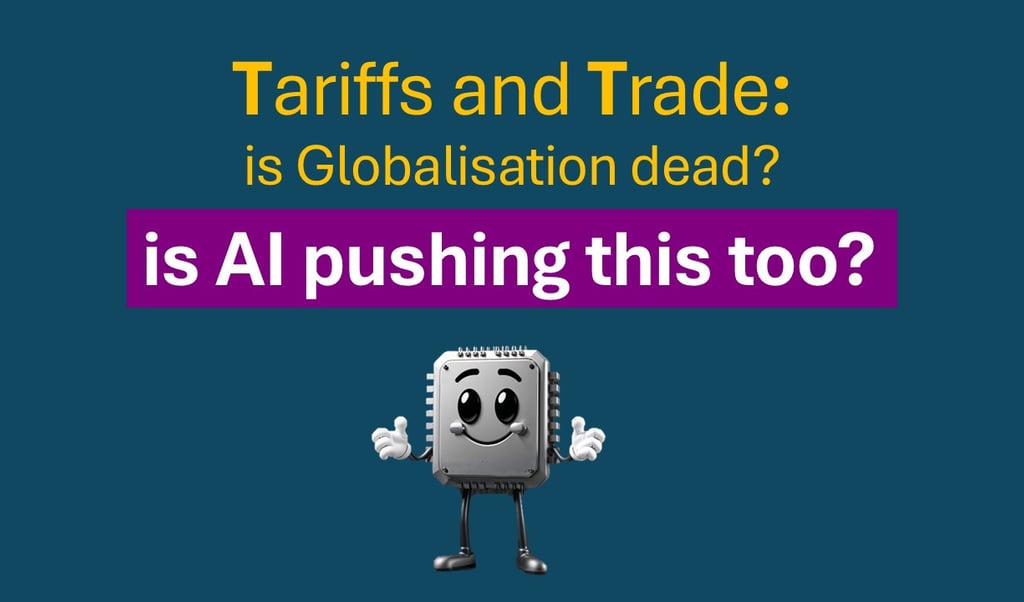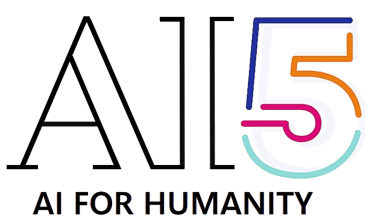Tariffs and Trade: is Globalisation dead?
is AI pushing this too?.
2SUPPLY CHAIN OF AIGOVERNMENTAL AI
11/5/20252 min read


Is Globalization Dead? The New Economic Era is Already Here.
Since the end of World War II, a US-led world order built on institutions like the IMF and World Bank has progressively dismantled trade barriers, ushering in the golden age of Globalization. For decades, this system was defined by "Just-in-Time" logistics, intricate global supply chains, and the free movement of capital, goods, and data, all driven by a relentless pursuit of efficiency and cost reduction.
Today, the entire system is being stress-tested. Geopolitical fragmentation and the rise of protectionism—symbolized by the return of major tariffs—are certainly signaling a new era. The question, however, isn't just about trade wars; it’s whether an even more powerful force is fundamentally reshaping the global economy: Artificial Intelligence.
The answer is yes. AI is not only accelerating the shift away from old models but is actively enabling a new one.
Phase I: The Pandemic Pivot
The first crack in the system came with the COVID-19 pandemic. Suddenly, the hyper-optimized "Just-in-Time" model, which prioritized efficiency above all else, turned into "Just-Too-Late". Global shipping was disrupted, factories shut down, and supply chains broke. The central lesson was stark: Resilience must replace Efficiency. This exposed the risk of complex global dependency and accelerated the trend toward local control.
Phase II: The Age of AI—A Dual Force
The shift from Globalisation is now being driven and defined by AI, acting as both a mandate and an enabler of localization.
1. AI Mandates Local Control (Sovereign AI)
As AI becomes the core infrastructure for defense, healthcare, and energy, governments worldwide are pushing for greater technological sovereignty.
Intelligence is Infrastructure: Critical resources like advanced semiconductors, data centers, and research ecosystems are now viewed as national security assets, leading to a scramble for localized, domestic control.
Data and Trust: Geopolitical distrust and the need for strict compliance (like the EU AI Act) are driving the demand for "Sovereign AI"—a commitment to building and running AI within a country's own borders, under local jurisdiction. For sensitive data, keeping AI physically and legally close to home is non-negotiable. The lesson: relying on "Just-in-Time" intelligence from a centralized source has become "Just-Too-Risky".
2. AI Facilitates Local Control ("Just-in-Reach")
On the economic front, AI is making domestic production competitive again, eliminating the core advantage of offshoring.
Smart Manufacturing: AI-driven automation, robotics, and advanced analytics reduce the need for cheap labor, allowing countries to rebuild domestic industries without returning to prohibitive labor costs.
Generative Design and Logistics: AI can optimize supply chains to the point where they are more agile, predictable, and local, dramatically cutting costs, reducing waste, and improving end-to-end visibility.
Globalisation is Reshaped, Not Dead
Globalization is not collapsing; it is being profoundly reshaped. The new economic paradigm will see a fragmentation of physical supply chains, driven by tariffs and the need for resilience, but it will be underpinned by a globally connected digital layer.
The core philosophical shift is complete: we are moving from a world of risky, long-distance supply chains to one of "Just-in-Reach" innovation. In this new era, economic security trumps pure efficiency, and the most valuable commodity is not cheap labor, but localized, sovereign intelligence.

© 2024. All rights reserved.



Delivered from
Switzerland
